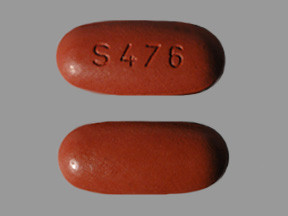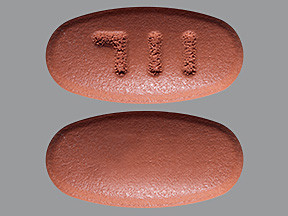MESALAMINE (5-AMINOSALICYLIC ACID) DELAYED-RELEASE 1.2 GM - ORAL
PHONETIC PRONUNCIATION: (me-SAL-a-meen)
COMMON BRAND NAME(S): Lialda
GENERIC NAME(S): mesalamine
Uses
USES: This medication is used to treat a certain bowel disease (ulcerative colitis). It helps to reduce symptoms of ulcerative colitis such as diarrhea, rectal bleeding, and stomach pain. Mesalamine belongs to a class of drugs known as aminosalicylates. It works by decreasing swelling in the colon.
How to use MESALAMINE (5-AMINOSALICYLIC ACID) DELAYED-RELEASE 1.2 GM - ORAL
HOW TO USE: Take this medication by mouth with a meal as directed by your doctor, usually once daily. Swallow this medication whole. Do not crush, chew, or break the tablets. Doing so can keep the drug from being released properly into the colon. The dosage is based on your medical condition and response to treatment. Use this medication regularly to get the most benefit from it. To help you remember, take it at the same time each day. Tell your doctor if your condition does not improve or if it worsens.
Side Effects
Precautions
Interactions
Overdose
Images

- color
- red brown
- shape
- oblong
- imprint
- WPI 2245
Reviews
Faq for MESALAMINE (5-AMINOSALICYLIC ACID) DELAYED-RELEASE 1.2 GM - ORAL
Mesalamine delayed-release 1.2 gm oral is commonly used to treat mild to moderate ulcerative colitis, an inflammatory bowel disease that affects the colon and rectum.
Mesalamine belongs to a group of drugs known as aminosalicylates, which have anti-inflammatory properties. It works by reducing inflammation in the digestive tract, thereby alleviating the symptoms associated with ulcerative colitis.
It is usually recommended to take Mesalamine delayed-release tablets as directed by your healthcare provider. The usual dose is typically once daily with food. Make sure to swallow the tablets whole and not crush, chew, or break them.
Some common side effects of Mesalamine include headache, nausea, diarrhea, stomach pain, gas, and dizziness. If these side effects persist or worsen, it is important to notify your doctor.
Yes, Mesalamine may interact with certain medications, including blood thinners (e.g., warfarin), azathioprine, and drugs that contain mercaptopurine. It is important to inform your doctor about all the medications you are currently taking to avoid any potential interactions.
It is recommended to consult with your doctor before taking Mesalamine if you are pregnant or planning to become pregnant. The use of Mesalamine during breastfeeding is generally considered safe, but it is best to discuss it with your healthcare provider.
The onset of action for Mesalamine varies from person to person. Some individuals may start experiencing improvement in symptoms within a few days, while others may take several weeks. It is important to continue taking the medication as prescribed and consult your doctor if there is no improvement.
Mesalamine delayed-release oral tablets are approved for use in children aged 5 years and older for the treatment of ulcerative colitis. However, the dosage and duration of treatment may vary based on the child's specific condition, so it is best to consult a pediatrician.
There are generally no specific dietary restrictions while taking Mesalamine. However, it is advisable to follow a balanced diet and drink plenty of fluids to support overall gastrointestinal health.
Disclaimer
IMPORTANT: HOW TO USE THIS INFORMATION: This is a summary and does NOT have all possible information about this product. This information does not assure that this product is safe, effective, or appropriate for you. This information is not individual medical advice and does not substitute for the advice of your health care professional. Always ask your health care professional for complete information about this product and your specific health needs.


No Reviews Yet